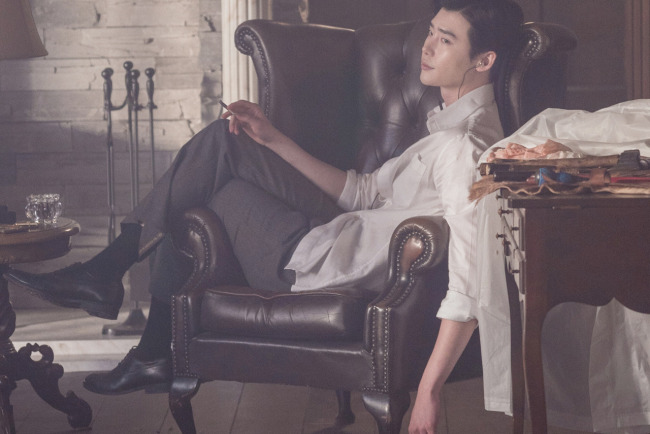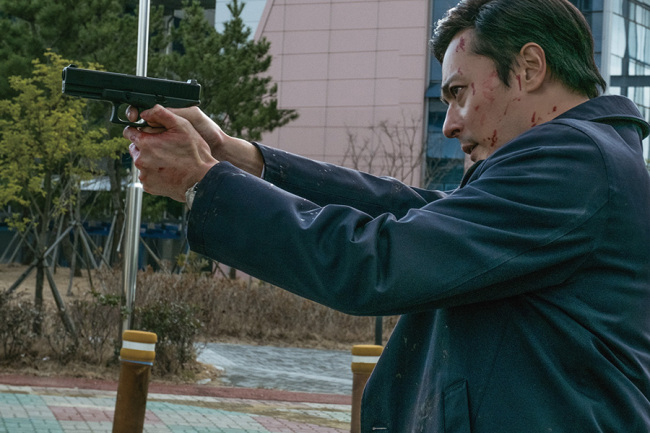The depiction of brutal female abuse in Korean films has become a hotly debated topic.
Noir-thriller “V.I.P.,” which opened in theaters last week, has come under heavy fire for its excessively lengthy and detailed depiction of the sexual abuse and murder of a female character.
In one long take, the camera dwells on several male characters, including Kim Kwang-il, a ruthless serial killer from North Korea played by Lee Jong-seok, caressing, torturing and choking a naked female victim lying on a table.
Viewers expressed outrage and exasperation at the scene. Online reviews said it was an unnecessary and exploitative display of cruelty that made no contribution to the plot.
 |
Lee Jong-suk stars in a scene in “V.I.P.” Directly after this shot, a female character is brutally abused. (Warner Bros. Korea) |
One particular review went viral, apparently written by a woman who had been sexually assaulted.
“A female victim, played by an actress who looks as innocent as can be, is raped by three men, completely naked and dripping blood. She is then injected with a shot and beaten. This scene lasts for over five minutes,” the review said. “(Male characters) who are described (as embodying) ‘justice’ beat their subordinates and hit all objects around them just because they’re mad. ... When will the film scene stop praising women’s nude scenes as sensational acting?”
Director Park Hoon-jung, who helmed “V.I.P.,” professed “shock” over such responses to his film.
“In my directorial judgment, I felt that Kwang-il’s demon-ness had to be highlighted to make the film convincing until the end. But I was mistaken about the degree (of violence). I feel like I was very ignorant,” Park said in an interview with local media.
At the same time, Park admitted he had decided to push through despite negative feedback in the production stage. Various crew members had expressed their discomfort at the torture scenes.
“If we filmed the strangulation scene from far away, the demonic character became weaker. ... I had to make it so that Kwang-il’s emotion and psychology would be clearly visible on his face when he was committing a crime. So we decided to endure the discomfort. It was a mistake to simply think ‘It’s uncomfortable for us (male crew members). It’ll probably be even more uncomfortable for women.’”
Park, who helmed “New World” (2013), is a director notorious for his depiction of the dark, jaded world of men, and has in the past been called out for the lack of powerful female characters in his works.
“Until now, I thought that my inability to write women characters came from my little understanding of women. But (I realize) that my gender sensibility wasn’t dull, it was nonexistent. I had thought that at least I wasn’t a male chauvinist, but I’ve learned from this incident that I cannot help being a Korean man (who doesn’t understand women).”
The film’s distributor has been quick in coming to its defense.
“The biggest issue in film production is ‘diversity,’” said Choi Jae-won, head of local production at Warner Bros. Korea, the film’s distributor. “Because it is (the big) screen and not (a TV) broadcast, there has to be diversity in the stories and expression. Because of the specificity of the film, it contains expressions that are described as ‘extreme.’”
Choi also described blind criticism of the film as “a sort of violence close to fascism.”
Film critic Jung Ji-wook agrees that artistic expression should be given free rein. “But it is a thin line between what is artistically necessary and what is exploitatively crude. There is no hard-and-fast rule. But the fact of the matter is that many people felt extreme revulsion while watching this film.”
While self-censorship should not be encouraged, the creator should “take responsibility” for his or her work, Jung remarked.
 |
Jang Dong-gun stars in “V.I.P.” (Warner Bros. Korea) |
According to film critic and columnist Hwang Jin-mee, the problem lies in the ability for empathy.
“The film draws the weak camaraderie between men as much larger than ... the pain of women who have been sacrificed brutally,” she said. “If the creator had been able to empathize with the pain of the women, it would have been hard to make the film in this way. But (the director) was able to empathize much more strongly with ... men struggling over (solving) a crime.”
Some say the heated debate is also a testament to a change in Korean viewers’ attitudes.
“Korean pop entertainment has been largely male-centric,” according to culture critic Choi Kyu-sung. “Nowadays, however, viewers are becoming more aware of and sensitive about violence -- violence toward females in particular.
“But I’m sure there are still many audience members who will argue that Korean cinema is as brutal to male characters as it is to women,” Choi added. “There will also remain men who idealize the notion of the macho ‘manly man,’ who will regard this whole issue as tedious.”
By Rumy Doo (
doo@heraldcorp.com)








![[Today’s K-pop] Blackpink’s Jennie, Lisa invited to Coachella as solo acts](http://res.heraldm.com/phpwas/restmb_idxmake.php?idx=644&simg=/content/image/2024/11/21/20241121050099_0.jpg)
